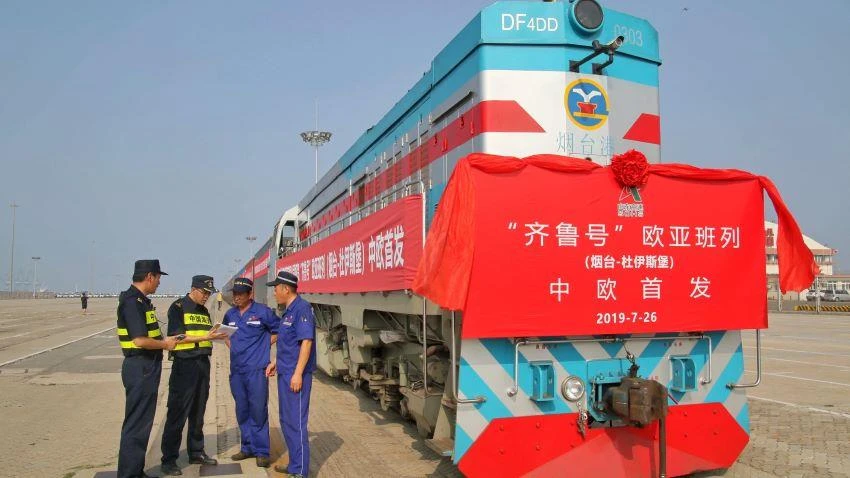
Russia greenlighted in early July a 2,000-km highway construction project connecting the country's border with Kazakhstan to Belarus.
The four-lane highway will run west from Orenburg Province to the former Soviet republic of Belarus via several other Russian provinces.
The location of the highway underscores the importance of the project: Belarus is a gateway to Europe, while Kazakhstan -- another former Soviet republic -- shares its eastern border with China, where a highway that crosses Kazakhstan originates.
Chinese President Xi Jinping is pushing his signature Belt and Road Initiative with the goal of creating a massive economic zone that will link China to Europe by land and sea. According to China's Ministry of Commerce, the new project marks Russia's entry into road construction vital to the land link, which will span about 8,500 km and be the shortest transport route from China to western Europe.
This is not Russia's first foray into developing land routes connecting Asia and Europe. In the first half of the 2000s, Moscow lobbied Japanese companies to transport cargo via its 9,300-km long Trans-Siberian Railway.
Companies tested the route, partly as a result of Toyota Motor's decision to build a plant in Saint Petersburg. But it never really panned out.
One of the reasons was due to heavy vibration that shook trains, both when running and when connecting to other freight trains. The vibrations were so strong that cargo would often become damaged. Furthermore, train connection schedules in Russia were erratic.
Even into the early 2000s, China was still not shipping regularly to Europe. It wasn't until 2011 that "block train" services were introduced for the first time under an initiative pushed by China's now-disgraced Bo Xilai, connecting the municipality of Chongqing to Germany via Kazakhstan, Russia, Belarus and Poland.
The block trains ran regularly and traveled between destinations without connecting with other trains or detaching cars along the way.
Later rebranded as China Railway Express, the block trains now shuttle between scores of stations in China -- including Sichuan and Dalian -- and Europe. And unlike like earlier iterations of the Trans-Siberian Railway, the Chinese trains are smooth and temperature controlled, allowing them to transport a wide range of goods, from PCs and automobiles to daily goods.
Japan's top international freight forwarder, Nippon Express, has also been offering rail transport service between China and Europe. The company said that its cargo volume over the route has rapidly increased.
The Trans-Siberian Railway has tried to shoulder into the burgeoning business but is handicapped by rail lines terminating in Moscow and other cities. This means that its Europe-bound block trains have to connect with other trains to complete the final leg of their journeys.
The China Railway Express has already replaced its Russian counterpart as the main railway network connecting Asia and Europe.
President Xi visited Moscow in early June for talks with his Russian counterpart Vladimir Putin. The visit was decried by some independent news websites in Russia, which published stories under headlines like "Russia for the sake of China" and "Putin's geopolitics and economy policies are transforming us into a country dependent on China."
During Xi's visit, the two countries signed about 30 agreements, including one for Chinese tech giant Huawei to build the country's 5G network. Xi also touted the stronger relations between China and Russia, saying that they were at their "highest level in history."
China and Russia kicked off their strategic partnership as more or less equals in 1996, and relations have become tighter as they close ranks against an increasingly hostile U.S.
But not everyone in Russia is celebrating the warmer ties. In reality, Russia has begun to feel like the junior partner due to asymmetries between it and its giant Asian neighbor.
The gap between the two countries is widening in many areas, including the economy, population, military and politics. For example, Russia's gross domestic product was only 12% of China's in 2018 and, according to a survey by the Stockholm International Peace Research Institute, its military spending is only a quarter that of China's.
On the other hand, China is short of resources and covets Russian oil, natural gas and forestry products. It is also sending large numbers of Chinese workers to Russia.
Russia has been shunned and sanctioned by much of the international community and is largely relying on China for its economic well-being. But Moscow still regards Central Asia as under its sphere of influence and has become alarmed by its partner's growing presence in the region, both economically and on the security front.
In a bid to strike a balance, Russia has been trying to improve ties with the U.S. and Europe, but as yet to no avail. If this situation remains, the creation of a new order in Eurasia could see a powerful China even more closely intertwined with Russia.
In light of this, it would be unwise to continue isolating Russia on the international stage.




















